- News
- Reviews
- Bikes
- Accessories
- Accessories - misc
- Computer mounts
- Bags
- Bar ends
- Bike bags & cases
- Bottle cages
- Bottles
- Cameras
- Car racks
- Child seats
- Computers
- Glasses
- GPS units
- Helmets
- Lights - front
- Lights - rear
- Lights - sets
- Locks
- Mirrors
- Mudguards
- Racks
- Pumps & CO2 inflators
- Puncture kits
- Reflectives
- Smart watches
- Stands and racks
- Trailers
- Clothing
- Components
- Bar tape & grips
- Bottom brackets
- Brake & gear cables
- Brake & STI levers
- Brake pads & spares
- Brakes
- Cassettes & freewheels
- Chains
- Chainsets & chainrings
- Derailleurs - front
- Derailleurs - rear
- Forks
- Gear levers & shifters
- Groupsets
- Handlebars & extensions
- Headsets
- Hubs
- Inner tubes
- Pedals
- Quick releases & skewers
- Saddles
- Seatposts
- Stems
- Wheels
- Tyres
- Health, fitness and nutrition
- Tools and workshop
- Miscellaneous
- Buyers Guides
- Features
- Forum
- Recommends
- Podcast
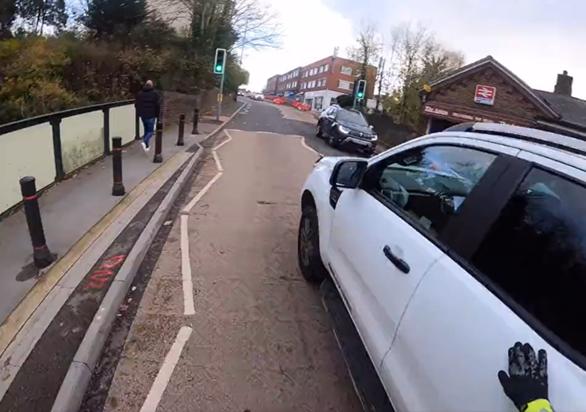 Pickup driver chases cyclist after close pass (Jay McSerk, Twitter)
Pickup driver chases cyclist after close pass (Jay McSerk, Twitter)Study finds drivers who cycle or understand recommended cyclist road positioning are less likely to blame cyclists for close passes
A newly published study has examined how drivers view close passes on cyclists, researchers looking into the effect of cycling experience, knowledge of recommended cyclist road positioning, and a driver's tendency to express anger behind the wheel on the way an individual perceives close pass incidents.
The academic research comes from Anglia Ruskin University's Centre for Sport and Exercise Science, and School of Psychology and Sport Science, and has been published in January 2024's volume of 'Transportation Research Part F: Traffic Psychology and Behaviour'.
The paper — the work of William Cubbin, Kjell van Paridon, Helen Keyes and Matthew Timmis — titled 'Close passes caught on camera – How knowledge and behavioural norms relate to perceptions of liability when cars overtake cyclists', examines responses from a sample of 239 UK drivers when shown eight video clips of close pass incidents submitted by cyclists as driving complaints to Essex Police in 2020. (Please note images used in this story are for illustration purposes only and do not show footage used in the study).
Researchers recorded the survey participants' "road use habits", including their self-defined identity on a driver-cyclist spectrum, and knowledge of recommended practice for bicycle positioning. It also identified a 'Driver Anger eXpression' (DAX) for each participant, essentially noting tendencies towards different forms of anger expression when driving, including those who use vehicle manoeuvres to express anger (such as through punishment passes).
The study found that drivers who were not cyclists apportioned greater liability to cyclists seen being close passed in the video footage. Furthermore, participants whose 'vehicleDAX' score (rating tendency to use vehicle manoeuvres to express anger when driving) was greater were less likely to agree that the close passes shown were dangerous.
Similarly, drivers with greater knowledge of recommended cyclist road positioning apportioned lower levels of liability to the cyclists being close passed than those drivers with less knowledge, suggesting that greater communication of the Highway Code and recommended safe practice for cyclists could improve drivers' attitudes on close passes.
"This is the first time that naturalistic footage reported by cyclists to police has been used to examine differing perceptions of the same close pass event," the researchers explained. "Findings show a need to share knowledge about cycling practice in order to help drivers navigate cycle traffic safely and considerately. This can inform road safety interventions that can contribute to safer cycling and driver behaviours that are more welcoming to existing and potential cyclists.
"The data shows that drivers who do not also ride a pedal cycle will apportion more liability to a cyclist reporting a close pass, than drivers who also cycle themselves. It also shows that drivers with a stronger tendency for expressing anger through vehicle manoeuvres will view close pass incidents as being of lower risk and attribute more liability to the cyclist, compared to the views of other drivers.
"Finally it has shown that better knowledge of recommended cyclist road positioning is a mediating factor that reduces the level of liability apportioned by drivers to cyclists who experience a close pass."
Of the 293 participants, 68 per cent were male and 32 per cent female. 15 per cent identified themselves as never cycling, while 7.5 per cent said they never drive. 49 per cent were 'more driver than cyclist'.
> Here's what to do if you capture a near miss, close pass or collision on camera while cycling
From a longlist of 85 close pass clips sent to Essex Police in 2020, the videos selected all showed a cyclist riding in accordance with the Highway Code who was passed by the driver of a motor vehicle from behind, and "represented a range of road widths, lateral clearances given by the motor vehicle and both presence and absence of temporary narrowing".
Participants were asked to rate pass severity via a five-point scale from 'strongly agree' to 'strongly disagree' in response to the statement "the incident was dangerous".
A similar three-part section examined opinions on liability of the cyclist and driver in each clip, while a 49-item questionnaire (Deffenbacher et al. 2002) was used to score tendency of participants towards different forms of anger expression when driving.
Information about driving experience, cycling experience, road user identity, and cycling knowledge were also noted for each participant.
The researchers concluded the findings support the hypothesis that "drivers who also ride a pedal cycle frequently or identify as cyclists will apportion less responsibility to a cyclist reporting a close pass, than drivers who do not cycle themselves".
> Cyclists wearing helmets seen as "less human" than those without, researchers find
"Further work is recommended to examine driver opinions of cyclist legitimacy in different road environments and different carriageway positions," the paper states.
"Drivers who also ride a bicycle attributed lower liability to the cyclist in close pass scenarios than drivers who do not also cycle themselves. This study adds further insight into components of this in-group bias, in particular that a shared sense of identity is not the only factor predicting lower liability attributed to cyclists.
"There appears to be a knowledge component to this relationship with 13.9 per cent of the variation in the measure for cyclist liability being predicted by variation in scores on the cycling position knowledge questions.
"This knowledge may frame the drivers' prior assumptions about cyclist behaviour in a positive way, helping them understand why a cyclist adopts a certain carriageway position or is in the road in the first place, thus reducing any tendency to suppose that the cyclist is subverting an expected norm or acting in a selfish or arrogant way."
Dan is the road.cc news editor and has spent the past four years writing stories and features, as well as (hopefully) keeping you entertained on the live blog. Having previously written about nearly every other sport under the sun for the Express, and the weird and wonderful world of non-league football for the Non-League Paper, Dan joined road.cc in 2020. Come the weekend you'll find him labouring up a hill, probably with a mouth full of jelly babies, or making a bonk-induced trip to a south of England petrol station... in search of more jelly babies.
Latest Comments
- VIPcyclist 2 sec ago
I remember, 40 years ago, telling my dad, who was a Daily Telegraph reader, he's now 'graduated' to the Daily Mail, that not everything in the...
- mattw 4 hours 20 min ago
Except it's such a pathetic little law that it has almost no footprint to be applied. It's a classic narrow minded kneejerk by a sad politician...
- mattw 4 hours 23 min ago
I think, along with others judging by the comments, that the cycling group have the wrong end of this - in that the travel conditions are similat...
- john_smith 4 hours 57 min ago
Actually, yes. Hundreds of thousands.
- chrisonabike 6 hours 44 min ago
Meanwhile, in the Netherlands......
- andystow 12 hours 5 min ago
I quite like the look of the tee, it would make it really hard to tell whether or not I had just come from a paintball fight.
- Simon E 12 hours 8 min ago
I fail to see why that is any more valid. The markets are not comparable, my point was about how some brands can sell overpriced, inferior products...
- David9694 12 hours 23 min ago
second home owner gets £60 parking penalty in Cornwall ...
- DoomeFrog 12 hours 50 min ago
The Best Overall are, by definition, also the best under £100?
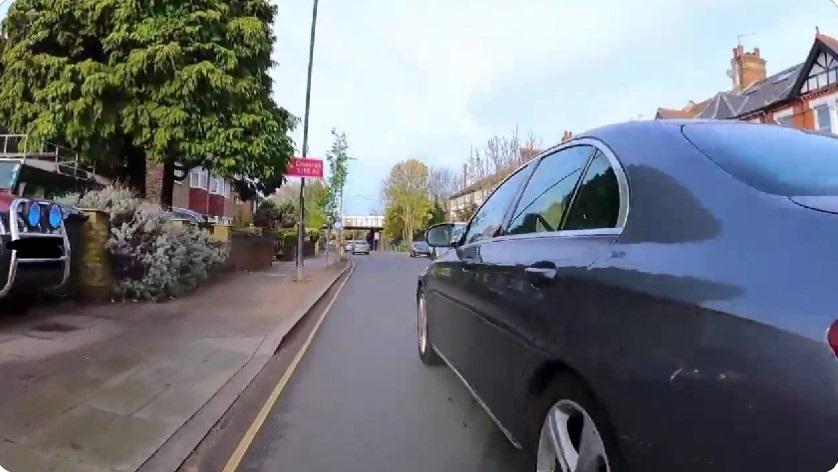
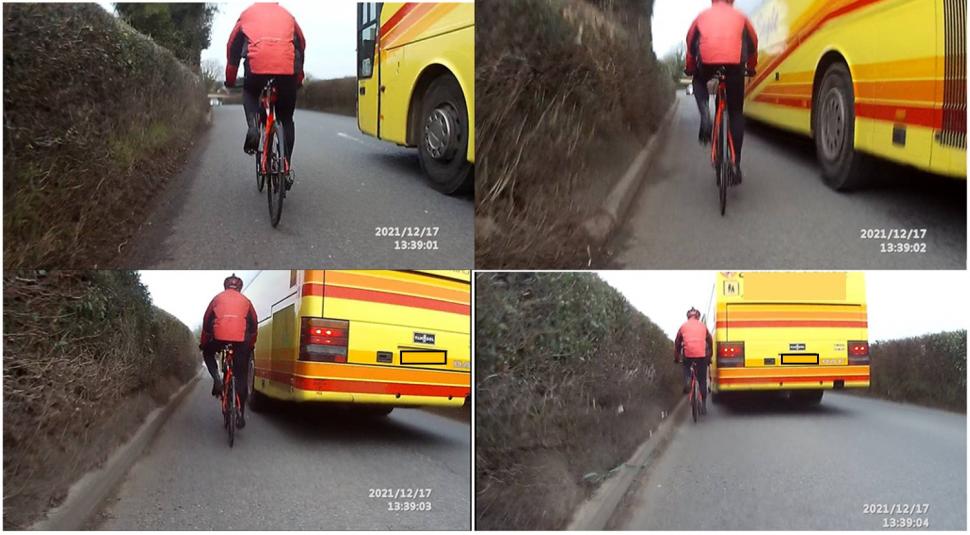
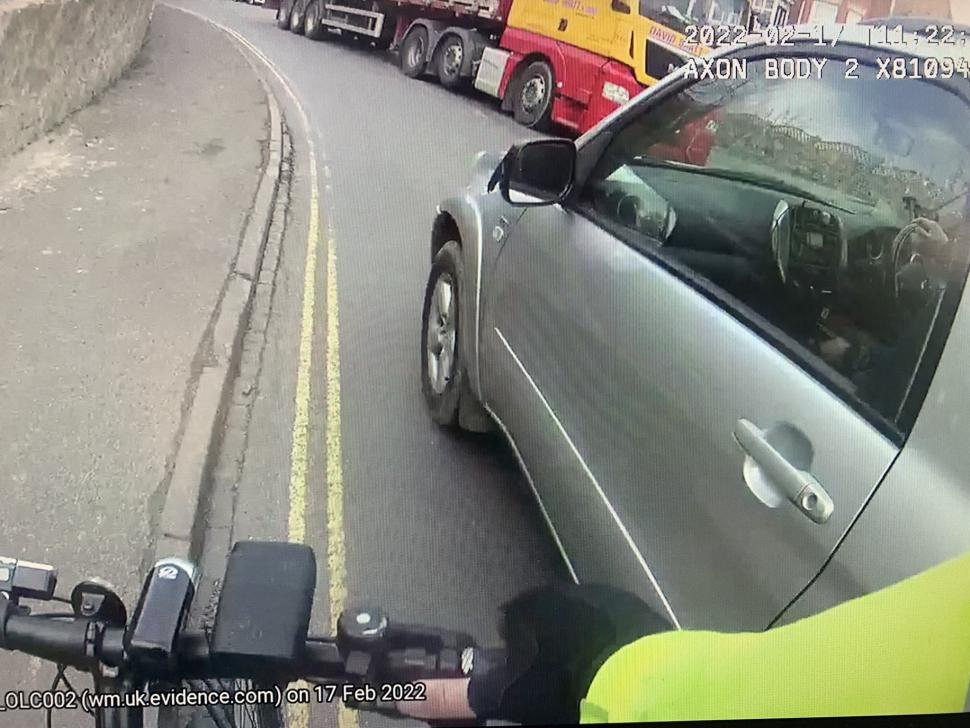
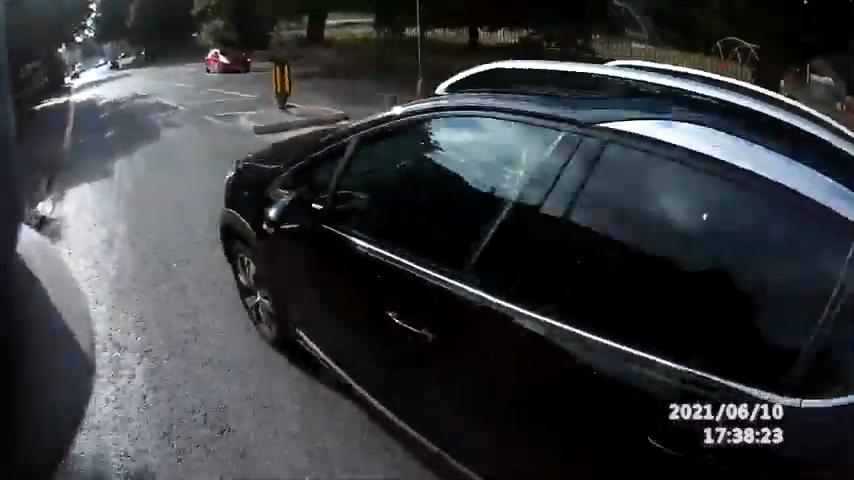
Add new comment
46 comments
From a longlist of 85 close pass clips sent to Essex Police in 2020...
It was Essex police, if I remember correctly, which came up with the dodge: the cyclist didn't brake or swerve, so it wasn't a proper close-pass. Therefore, we can be pretty sure that no significant action was taken over any of those 85 reports
Met police also use the swerve argument to reject close-pass evidence they don't think looks bad enough.
I'm wondering if it might be worth abruptly grinding to a halt and pulling over after a close pass and screaming/weeping for a while on camera to make it clear how affected I am
I'm wondering if it might be worth abruptly grinding to a halt and pulling over after a close pass and screaming/weeping for a while on camera to make it clear how affected I am
You could try, but it would be unlikely to do you any good- they would just think up another excuse for doing nothing. I didn't fabricate the pulling over I did on this video- I was genuinely shocked. Naturally, the Lancashire Constabulary b******s ignored the report. You will notice that I don't swerve or brake- there isn't time when somebody rockets past at 40+. In case I haven't made it clear enough: I really despise the police!
https://upride.cc/incident/ca70mkc_citroenvan_closepass/
Police Scotland don't even bother with an excuse.
They just don't bother.
Gonna be even worse with the foecasted closure of 29 stations.
So, friction between drivers and cyclists stemming from drivers not having any idea what the rules are, and getting pissy at cyclists for doing exactly what they're supposed to be doing?
In other news: water wet...
Another ursine defecation in arboreal environments study. Who is funding this research?
Those who profit from nothing being actually done.
Nothing really surprising here. What was the viewpoint in the close passes, were they all from the victim on their bike? These often make the space look bigger than it is, the top photo with the white Dacia (I think it is) doesn't look too bad...until you realise that's the cyclists hand touching the car!
It was a big pickup if I remember correctly.
Exactly - as someone of above average hieght, if I can even reach a passing car, they're giving probably less than a third of the minimum passing distance. If I can reach a car with palm and forearm flat (as in the photo), then the wing mirror probably overlapped the handlebars. If the cyclist in the photo is shorter than me, then that's even worse.
*unless you are Mr Tickle
I had a discussion with someone whos car I banged on the side of because they were so close. He didn't think there was anything wrong with the pass because he didn't hit me. The fact I could easily bang on the side of his car didn't register with him as being too close despite my arms probably being 80cm at full stretch and me banging on his car meant he was probably 30cm from my bars.
Tempting but I would now never do this. Sadly that's straight to "touch my motor, I swear I'll do time" territory with a significant few, which I've no desire to visit.
He didn't think there was anything wrong with the pass because he didn't hit me
Unfortunately, this is also what most police think. I realise that Lancashire Constabulary is probably one of, or the, worst in England and Wales, but how can you get any closer than this? I was terrified for 2 or 3 seconds that the Sainsbury's lorry would jerk my bars, or that I would hit the kerb- in either case, would probably go under the wheels. No response whatsoever from the police. Can't complain to the police about the police- 'Professional Standards' is a laughable police organisation. Can't complain to the PCC- they describe everything as 'an operational decision of the police which we can't interfere with', can't complain to Ben Wallace MP- he just says 'complain to the police'.
https://upride.cc/incident/yn67mvj_sainsburys44tonner_closepass/
Told many times, when taking a car driving license (even more for HGVs), able bodied candidates should be made to ride a bicycle and closed passed several times in a controlled environment.
If there was a formula to repeat this every year, this problem would have been sold.
The driving test should include a compulsory cycling portion. Anyone unable to ride a bicycle would be offered the option of a tricycle or hand cycle. The percentage of disabled people unable to use a hand cycle and yet would want to be able to drive is vanishingly small.
I'd make this retrospective, so that anyone renewing a driving licence would also have to pass cycle training.
We know from research that cyclists and motorcyclists make better drivers due to better hazard awareness and better understanding of suitable speeds for road conditions and so on. So why not ensure that everyone benefits from this?
Getting a provisional licence (before you get anywhere near being allowed to operate a car, even with an instructor, let alone enough experience to take a driving test) should require passing a suitable cycling test (Preferably inc minimum milage etc).
Would agree that a cycling test pass should be required to renew a driving licence.
Pages